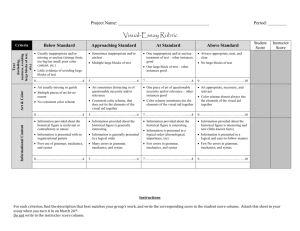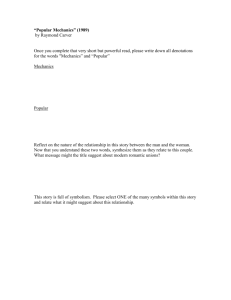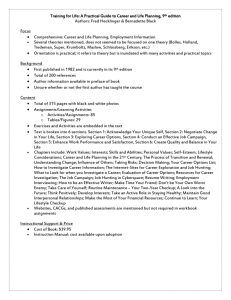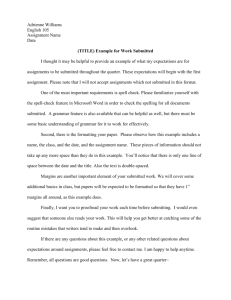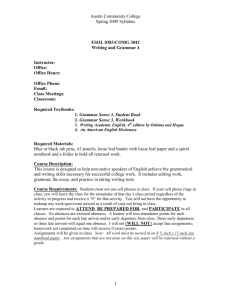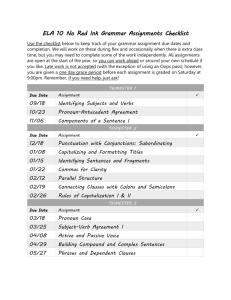Frank Cha - Christine Grogan
advertisement
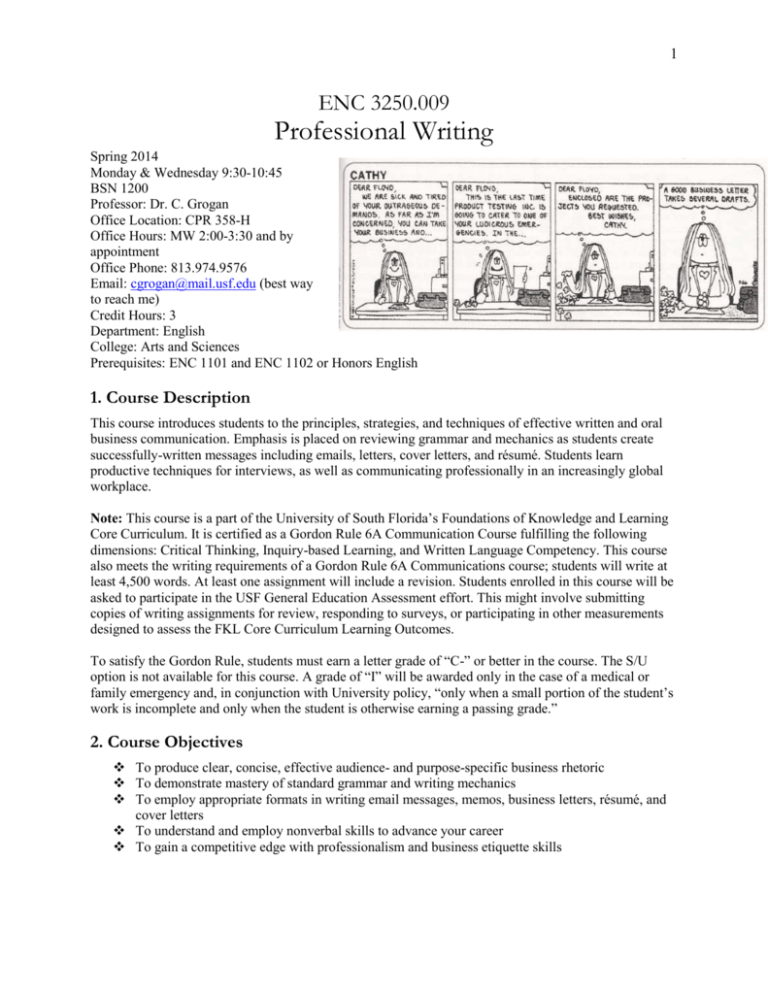
1 ENC 3250.009 Professional Writing Spring 2014 Monday & Wednesday 9:30-10:45 BSN 1200 Professor: Dr. C. Grogan Office Location: CPR 358-H Office Hours: MW 2:00-3:30 and by appointment Office Phone: 813.974.9576 Email: cgrogan@mail.usf.edu (best way to reach me) Credit Hours: 3 Department: English College: Arts and Sciences Prerequisites: ENC 1101 and ENC 1102 or Honors English 1. Course Description This course introduces students to the principles, strategies, and techniques of effective written and oral business communication. Emphasis is placed on reviewing grammar and mechanics as students create successfully-written messages including emails, letters, cover letters, and résumé. Students learn productive techniques for interviews, as well as communicating professionally in an increasingly global workplace. Note: This course is a part of the University of South Florida’s Foundations of Knowledge and Learning Core Curriculum. It is certified as a Gordon Rule 6A Communication Course fulfilling the following dimensions: Critical Thinking, Inquiry-based Learning, and Written Language Competency. This course also meets the writing requirements of a Gordon Rule 6A Communications course; students will write at least 4,500 words. At least one assignment will include a revision. Students enrolled in this course will be asked to participate in the USF General Education Assessment effort. This might involve submitting copies of writing assignments for review, responding to surveys, or participating in other measurements designed to assess the FKL Core Curriculum Learning Outcomes. To satisfy the Gordon Rule, students must earn a letter grade of “C-” or better in the course. The S/U option is not available for this course. A grade of “I” will be awarded only in the case of a medical or family emergency and, in conjunction with University policy, “only when a small portion of the student’s work is incomplete and only when the student is otherwise earning a passing grade.” 2. Course Objectives To produce clear, concise, effective audience- and purpose-specific business rhetoric To demonstrate mastery of standard grammar and writing mechanics To employ appropriate formats in writing email messages, memos, business letters, résumé, and cover letters To understand and employ nonverbal skills to advance your career To gain a competitive edge with professionalism and business etiquette skills 2 3. Required Texts Guffey, Mary Ellen, and Dana Loewy. Essentials of Business Communication, 9th ed (PRINT only but it may be cheaper to buy the bundle) 4. Course Policies Attendance: You are expected to come to class prepared. You must have read the chapter and completed the assignment for the day. You will be called on in class. As in the workplace, you must attend and be on time. Because of the interactive nature of this course, absences will seriously affect your final grade. You are allowed to miss two classes without being penalized. You can use these absences for family emergencies, oversleeping, doctor’s appointments, car problems, pet problems, work issues, and alien encounters. Every unexcused absence thereafter will lower your Preparation grade 10 points. Each excused absence must be supported by documentation (such as a doctor’s note, a police report, or some proof of funeral attendance) within a week of the absence. “Students who anticipate the necessity of being absent from class due to the observation of a major religious observance must provide notice of the date(s) to the instructor, in writing, by the second class meeting” (January 8th). I reserve the right to count you as absent if your behavior indicates an intellectual absence (that is, if you read the newspaper, play with your phone or laptop, etc.). Ten or more absences will result in automatic failure from the course. Do not be late. Tardies lower your Preparation grade by 5 points. Same applies for leaving class early. If you arrive late, it is your responsibility to check with me that class period to ensure the absence is changed to a tardy. Technology: Use of cell phones, iPods, and laptops is prohibited during class—this includes textmessaging. Students are required to use Canvas for course assignments and grading information. In addition, students are required to check USF email on a regular basis. You must print your assignments. Plagiarism: The penalty for plagiarism will be automatic failure in the course, and a notification of the circumstances will be sent to the Dean of Students with a letter of intention to assign an F or FF. See me if you are in doubt as to what constitutes plagiarism. “The University of South Florida has an account with an automated plagiarism detection service which allows instructors to submit student assignments to be checked for plagiarism. I reserve the right to submit assignments to this detection system. Assignments are compared automatically with a huge database of journal articles, web articles, and previously submitted papers. The instructor receives a report showing exactly how a student’s paper was plagiarized.” See http://www.usg.usf.edu/pdf/cat1213/Final_Catalog.pdf for USF Undergraduate Catalogue’s definitions and policy, and consult with me if you are uncertain. SDS: “Students in need of academic accommodations for a disability may consult with the office of Students with Disabilities Services to arrange appropriate accommodations. Students are required to give reasonable notice prior to requesting an accommodation. Contact SDS at 974.4309 or www.sds.usf.edu.” Due Dates: Assignments are due during the class period in which they are scheduled to be due. Exams, quizzes, in-class work, and presentations cannot be made up. Papers must be printed and stapled. I will deduct 5 points for unstapled papers. Late papers (without proper documentation) will result in a 0. In addition to submitting hard copies, you may be required to submit assignments electronically. 3 Professionalism: I expect you to be professional at all times. Respect others’ opinions, especially when they differ from your own. Notes: Recording of class lecture or discussion on any media is prohibited without my written permission. Students are not permitted to sell notes or tapes of class lectures. 5. Graded Assignments Group Work (Editing Challenges) Assignment 1: Email Assignment (Chapter 5—page 131) ~250 words Assignment 2: Positive Letter (Chapter 6—6.6, 6.15, or 6.19) ~250 words Assignment 3: Negative Letter (Chapter 7—Video Resources exercise) ~250 words Assignment 4: Persuasive Letter (Chapter 8—8.6) ~250 words Assignment 5: Cover Letter and Résumé ~750 words Mock Interview Unit Test 1 (Chapters 1-4) Unit Test 2 (Chapters 5-9) Assignment 6: Revised Cover Letter and Résumé ~750 words Homework (random checks) ~2000 words Preparation A+ (97-100) 4.00 B+ (87-89) 3.33 C+ (77-79) 2.33 D+ (67-69) 1.33 A (93-96) 4.00 B (83-86) 3.00 C (73-76) 2.00 D (63-66) 1.00 A- (90-92) 3.67 B- (80-82) 2.67 C- (70-72) 1.67 D- (60-62) 0.67 5% 5% 5% 5% 5% 15% 10% 10% 10% 10% 10% 10% 6. Tentative Schedule All readings should be done before the relevant class period. I reserve the right to give quizzes if students do not appear to be reading. Week 1 Jan 6 Syllabus, Introductions, In-class Writing (persuasive letter) Jan 8 Group Work: Editing Challenge 1 (page 30) Week 2 Jan 13 Chapter 1 and Homework—Chapter Review #6-15; Grammar/Mechanics Checkup #1-15 Jan 15 Grammar/Mechanics Diagnostic Pretest Week 3 Jan 20 No School Jan 22 Grammar/Mechanics Review Week 4 Jan 27 Grammar/Mechanics Review Jan 29 Chapter 2 and Homework—Chapter Review #6-15; Grammar/Mechanics Checkup #1-15 Week 5 Feb 3 Chapter 3 and Homework—Chapter Review #6-15; Grammar/Mechanics Checkup #1-15 Feb 5 Chapter 4 Homework—Chapter Review #6-15; Grammar/Mechanics Checkup #1-15 Week 6 Feb 10 Unit Test 1 Feb 12 Group Work: Editing Challenge 4 (page 102) 4 Week 7 Feb 17 Chapter 5 Feb 19 Chapter 5 Homework—Chapter Review #6-15; Grammar/Mechanics Checkup #1-15 Week 8 Feb 24 Chapter 6; Assignment 1 Due Feb 26 Chapter 6 Homework—Chapter Review #6-15; Grammar/Mechanics Checkup #1-15 Week 9 Mar 3 Chapter 7; Assignment 2 Due Mar 5 Chapter 7 Homework—Chapter Review #6-15; Grammar/Mechanics Checkup #1-15 Week 10 Mar 10 No School Mar 12 No School Week 11 Mar 17 Chapter 8; Assignment 3 Due Mar 19 Chapter 8 Homework—Chapter Review #6-15; Grammar/Mechanics Checkup #1-15 Week 12 Mar 24 Chapter 9; Assignment 4 Due Mar 26 Chapter 9 Homework—Chapter Review #6-15; Grammar/Mechanics Checkup #1-15 Week 13 Mar 31 Unit Test 2 Apr 2 Chapter 13 and Homework—Chapter Review #6-15; Grammar/Mechanics Checkup #1-15; Assignment 5 Due Week 14 Apr 7 Chapter 14 and Homework—Chapter Review #6-15; Grammar/Mechanics Checkup #1-15 Apr 9 Chapter 14; Assignment 5 Due Week 15 Apr 14 Mock Interviews Apr 16 Mock Interviews Week 16 Apr 21 Mock Interviews Apr 23 Mock Interviews Apr 25 Assignment 6 Due (by 4 pm in my office)
